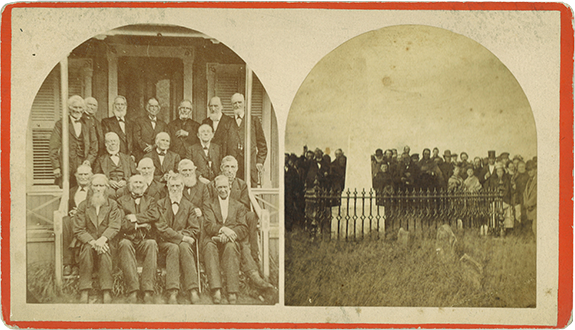When the New England Free Will Baptists (leaders pictured below left, and at the grave of Benjamin Randall, right) merged with the Northern Baptists in 1911, it seemed an era had ended and a heritage lost. Several schools, the only Free Will Baptist foreign missions program, a publishing house, and a number of able leaders were swallowed up in the new merger. But all was not lost. A remnant of this segment of the denomination in both the Midwest and far West remained true to their original convictions.
Churches of the New England heritage could still be found in Ohio, Kentucky, West Virginia, Illinois, Missouri, Kansas, Nebraska, and Texas. The Oklahoma churches were probably founded through the ministry of missionaries from Arkansas, but they would relate to the New England remnant through their membership in the old Southwestern General Conference.
The Southwestern General Conference had been admitted to the General Conference of New England in 1907 and remained true to its Free Will Baptist convictions even after the 1911 merger, the majority of the Southwestern churches joined with the new combined body.
The remnant of the Conference formed the Cooperative General Association of Free Will Baptists. The new organization was formally sanctioned at the Philadelphia Church near Pattonsburg, Missouri, on Wednesday, December 27, 1916, and a constitution and by-laws were approved the following year. This new association brought together the Free Will Baptists in the West and Southwest into one body and later became one of two major conferences that joined to form the National Association of Free Will Baptists in 1935.
But it is not enough to speak of people as New England’s only legacy to the contemporary denomination. Much of the theology that guided the Cooperative Association and, indeed, many Free Will Baptists in the early 20th century can be traced to Benjamin Randall’s careful attention to Scripture and its teachings. The first Treatise adopted by the Cooperative General Association was almost a verbatim copy of the revised statement of faith published by New England Free Will Baptists in 1869. The New England segment of the denomination was gone, but its legacy continues in today’s Free Will Baptist movement.
About the Writer: William F. Davidson was professor of Church History at Columbia International University, in Columbia, South Carolina. Dr. Davidson is an alumnus of Peabody College, Welch College, Columbia Bible College, Northern Baptist Seminary, and New Orleans Baptist Seminary. The Ayden, North Carolina, native also served as pastor of Free Will Baptist churches in Kentucky and Virginia.


